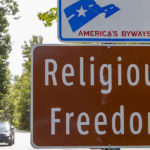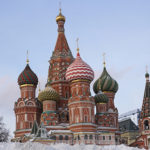Christian publications like the Baptist Standard exist by God’s calling, and in free societies, they enjoy the triple freedoms of religion, speech and press.
For more than 130 years, the Standard has been free to report the good, bad and indifferent about Baptist life in Texas, the United States and the world, and to communicate the gospel of Jesus Christ throughout the same.
During those 130 years, the Standard sometimes has published news and opinion at odds with the desires of the Baptist General Convention of Texas, the Southern Baptist Convention or other Baptist entities. More often, the Standard has published content in support of those groups.
If Russian President Vladimir Putin or the Russian state were in charge, such freedom to report would not exist. All too often, what Baptists believe, proclaim and do are at odds with Putin and his regime.
Russia’s attempted control of the narrative about its invasion of Ukraine illustrates what Baptists and other Christians lose without a free religious press.
Limited ‘freedom’ of the press
Throughout Putin’s presidency, freedom of religion and the press in Russia have not exactly lived up to the name. As recently as 2021, the U.S. Commission on International Religious Freedom moved Russia from its “special watch list” to its list of “countries of particular concern” due to deteriorating “religious freedom conditions” in 2020.
Any religious or press freedom that existed in Russia over the last 20 years was limited in scope, a narrow scope designed to prop up Putin and his regime. I refer to press freedom in Russia in the past tense, given new legislation recently passed March 4 by the Duma—the Russian parliament—and signed into law the same day by Putin. The law criminalizes so-called “fake news” with a penalty of up to 15 years in jail.
“Fake news” appears to include any reporting that “discredits” Russian armed forces, labels Russian actions in Ukraine an “invasion,” or agrees with sanctions against Russia. Russian state-owned, state-funded and state-friendly media organizations likely are not in any danger of running afoul of this new law.
Limited religious ‘freedom’
Putin has styled himself a “protector of the faith,” and certain American evangelicals have agreed, based on his opposition to Islam and LGBTQ rights. Ironically, however, Putin’s faith does not baptize the Christianity of his American admirers.
Sign up for our weekly edition and get all our headlines in your inbox on Thursdays
Putin’s so-called defense of faith is limited to Orthodox Christian faith and must be considered alongside atheist Soviet Russia’s attempt to stamp out religion within its reach. From that standpoint, any nod toward any religion could be marked as a “defense,” even if not a full-throated defense of the kind enshrined in the First Amendment to the U.S. Constitution.
According to the U.S. Commission on International Religious Freedom report mentioned earlier, the Russian government considers “independent religious activity as a threat to social and political stability and to its own control.” Much of Protestantism falls within “independent religious activity.”
A recent law against “illegal missionary activity” resulted in at least one Russian Baptist worship service being interrupted and two Baptists being “punished for discussing their faith at a bus stop.”
Effect of limited ‘freedom’
For all intents and purposes, independence is criminalized in Russia. Independent religion and an independent press certainly are. One result is the current blackout in Russia of any news casting Putin and his regime in a negative light.
A recent Business Insider headline says it all: “Putin’s disinformation is so effective that Ukrainians can’t convince their own families in Russia they are under attack.” Business Insider is not the only outlet to report such disbelief.
If Putin is in the right, why would he be afraid of news outlets describing his actions as an unprovoked invasion of a sovereign neighboring nation? Nevertheless, Putin and his admirers dispute that characterization.
But without a free press, we’re not left with debating the truth; we’re left with what one person or a handful of people want us to believe.
Maintaining freedom
Sometimes it’s hard to see a concern right in front of us until it’s glaringly obvious somewhere else. Putin has done that for us, bringing a host of issues into stark relief.
We might be tempted to think there’s no reason for concern here. However, it doesn’t take a ruler or a government to limit an independent and free religious press. It only takes something much more common, something as human as fear and apathy.
When we fear the truth, we are tempted to find ways to cover or spin it. When we don’t care about the truth, we can’t be moved to make it known.
For more than 130 years, Baptists in Texas have been passionate and courageous about the truth, as demonstrated by the establishment and continuing support of an independent religious news organization—the Baptist Standard.
And as long as God’s call continues, we will embody that same passion and courage about the truth—even if Putin were in charge.
Eric Black is the executive director, publisher and editor of the Baptist Standard. He can be reached at [email protected] or on Twitter at @EricBlackBSP. The views expressed are those solely of the author.














We seek to connect God’s story and God’s people around the world. To learn more about God’s story, click here.
Send comments and feedback to Eric Black, our editor. For comments to be published, please specify “letter to the editor.” Maximum length for publication is 300 words.